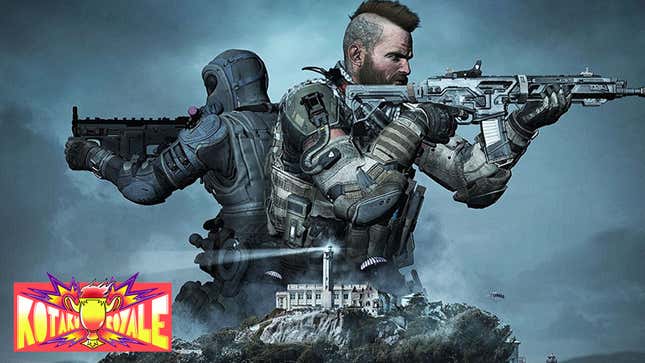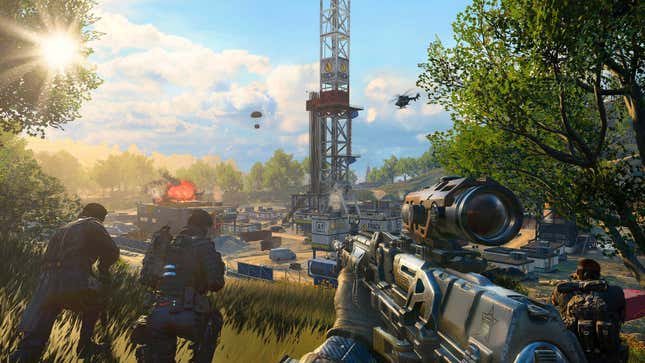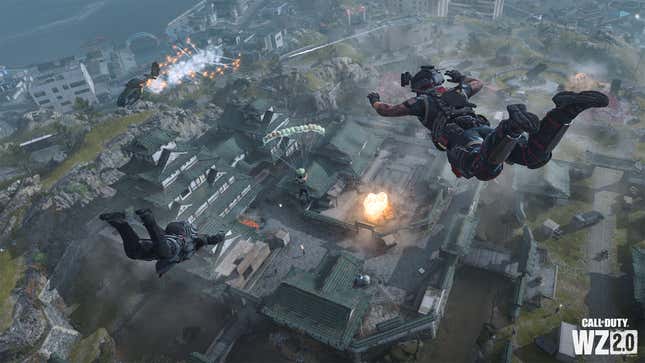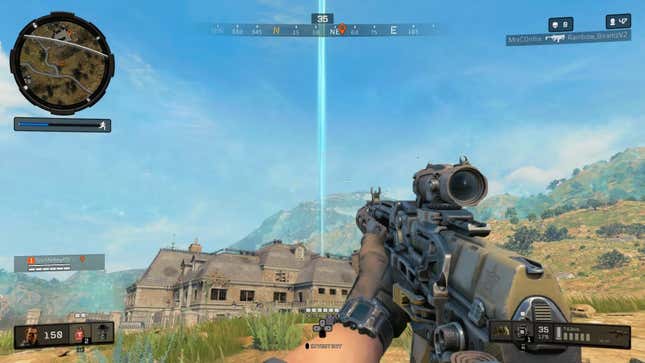
Six or seven days a week, MinerHoboJo fires up his PlayStation 5 and signs into Twitch or YouTube to stream a five-year-old game—Blackout, the first Call of Duty battle royale. By his own estimation, and community consensus, Miner is the game’s global leader in solo wins and kills. (There are no public stats for Blackout.) He’s earned this unofficial title partly by having the kind of skills that allow him to routinely make near-impossible in-game plays. But it’s also due to the simple fact that, like the tortoise that raced the hare, he’s continued to play Blackout long after almost everyone else has lost interest.
Read More: Let’s Rank The Call of Duty Games, From Worst To Best
Blackout was released as part of Black Ops 4 in October 2018—almost half a decade ago. That’s a lifetime in the hyper accelerated world of annual game releases and shifting genre preferences; playing Blackout in 2023 is the rough equivalent of using a Nokia brick phone or driving a ’91 Ford Taurus. Blackout was wildly popular in its day, the first AAA realistic battle royale for players who were turned off by Fortnite’s kiddie aesthetic. But when Warzone, Blackout’s wildly popular successor, came out during the first month of the 2020 covid-19 pandemic, Blackout became a ghost town overnight.
But then a strange thing happened. Turned off by Warzone’s shortcomings, some players started returning to Blackout. Not a lot, but some. A few years later, they’re still here, a small but diehard community of holdouts playing a game they consider to be the perfect BR, a cautionary tale for players and developers alike about what happens when you make a game too good.
Many nights, Miner has more viewers in his stream than there are players on the actual game. While there are no publicly-available player base stats for Blackout, it usually seems like there’s only one 100-player solo lobby going at a time on Playstation, and past peak hours, it often takes up to 20 minutes just to fill up halfway. Judging by custom emblems complete with different countries’ flags and the shouted obscenities in death chats, the players that remain are scattered around the world—the U.S., Turkey, Germany, Finland, Italy, France, the Azores, Russia, Japan, Mexico, Brazil, and more.
The Blackout holdouts

Blackout is very much a five-year-old game on life support, which means there are some unique quality of life problems. In a healthy BR, lobbies have a predictable distribution of player quality; for the average player, there’ll be a bunch of scrubs to crap on, a good number of equally skilled players that will require superior tactics to best, and a few elites who, 99 times out of 100, will kill you easily, often in humiliating fashion and often for the amusement of an audience on a streaming platform. There’s no such skill diversity on Blackout. At this point, every player is a sweat-drenched, max-level veteran who’s been playing nonstop for several years. There are no easy kills. If a normal BR is a pickup game at the neighborhood court, Blackout is the NBA All-Star Game.
Everyone knows everyone, making every game weirdly personal. If you always drop in the same spot, you know, intimately, every other player who drops there—whether they camp or rush, their weapon preferences, the paths they take. If you die and spectate the game until the end, the winner will no doubt be a player you’ve killed, and been killed by, countless times. Post-game lobbies are dominated by the angry shouting of players who’ve been nursing grudges since late 2018. All you do is drive around the whole game, stop playing like a little bitch, I’m going to come to your house when you’re sleeping. This doesn’t sound like the generalized faux-hate of sports fans (“I hate the Patriots”), these are specific and bitter resentments. As one Twitch commenter put it in a recent Blackout stream, “I couldn’t be in a room with half these mfers, I’d be in prison.”
So why are they still here, locked in a never-ending struggle, when the game’s successor, the free-to-play and, by almost any measure, massively successful Warzone is just sitting there, with millions of active players?
Why not Warzone?

Ask a Blackout holdout why they’re still playing a five year old game, and they’ll tell you that Blackout is just better. MinerHoboJo says Blackout is “perfect. The map is vibrant, good movement and good guns. You’re able to master multiple different mechanics and perfect your craft. There’s a skill gap.” Implicit in these praises are some of the most common criticisms of Warzone: it’s slow, it’s boring, movement and gunplay feel sluggish, there’s no skill gap. (In a high skill gap game, like Blackout, it’s very difficult for lesser-skilled players to kill highly-skilled players, which theoretically rewards excellence. In low skill gap games like Warzone, it’s much easier for low-skill players to kill elite players, which certain players contend punishes excellence and caters to casuals.) As someone who’s played both games, I think these criticisms are fair. Warzone just feels like a crappier game. The crazy thing is that’s probably by design.
In the early 2000s, pioneering consumer research by a Harvard-trained mathematician and experimental psychologist found that the key to “product optimization” was, essentially, mediocrity. Working on behalf of the junk food industry, researchers found that while consumers initially like “high intensity” experiences, they quickly burn out on them. The “bliss point,” where consumers maximize their consumption, is actually somewhere in the middle. It’s why the most popular junk foods—potato chips and Coca-Cola—are kind of bland. Make junk food taste too good, and they’ll consume less. It’s inconceivable that Call of Duty, a multibillion-dollar global franchise, isn’t aware of this research.
Read More: Call of Duty’s Blackout Mode Keeps Getting Better
It would certainly explain why Warzone is so meh. If you were in an industry that measured success partly by playtime and engagement, and you wanted to produce a lower-intensity experience that players could binge on without burning out, most of the changes Warzone made to the Blackout formula are just the variables you’d want to tune down. Movement is slower and less frenetic; multiple paths to a respawn means dying is no big deal, a larger map with more hiding places cuts down on player encounters, loadouts eliminate the randomness of relying on ground loot, aa low “time to kill” means gunfights are often over before you’ve even registered you’re being shot, and a compressed skill gap means you never get definitively clowned; death is just something that happens to you now and then, like weather. Compared to Blackout, the stakes in a game of Warzone are so low they’re almost nonexistent; when you lose, you just shrug and queue up for the next lobby.
So how did Blackout turn out so well? My personal theory—call it a conspiracy theory if you like—is that it was more or less an accident. According to reports, Blackout was thrown together in just a few months, as a last-minute substitute for the canceled campaign mode. In that timeframe, it’s hard enough just to build a game that runs, much less a product “optimized” to maximize playtime and revenue. Developers did the best they could, and everything came together weirdly well, like a 10-page paper you bang out in an hour that gets an A.

Under this theory, once Blackout provided proof of concept as a COD BR, the studio put all its resources into making sure the next game incorporated all the lessons of consumer psychology. And give them credit—they succeeded beyond any reasonable expectations. As a game, Warzone is a C- at best; as a revenue generator, it’s an A+. Of course, these critiques may be missing the point. Activision doesn’t exist to make good games; it exists to make money.
But Blackout is a reminder that they can make a good game if they want to—but probably shouldn’t. Blackout proves that if you make a product too good, some of your customer base simply won’t buy the next model—the doomsday scenario for an industry that runs on annual blockbuster releases. How much would Apple stock be worth if everyone was still using the first iPhone? Intentional mediocrity is the new planned obsolescence.
Meanwhile, the Blackout holdouts keep playing a game that hasn’t had an update for years, and may not last much longer. On the moribund Blackout subreddit, commenters flatly state that Activision wants their beloved game to die so that the last stragglers will be forced to move onto Warzone. Who knows if or when they’ll pull the plug on the few remaining servers?
All the Blackout holdouts can do is play on, waiting 20 minutes to play a half-full lobby, killing and being killed by the same players as yesterday, and the day before that, and the day before that. When will it end? Asked how much longer he can see himself streaming Blackout, MinerHoboJo says, “Until there is a Blackout 2.”